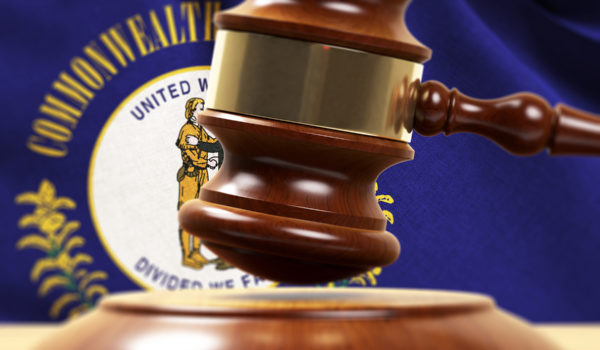On Friday, May 8, a federal district judge in the Eastern District of Kentucky issued a temporary restraining order (“TRO”) in favor of plaintiff Tabernacle Baptist Church in the case Tabernacle Baptist Church, Inc. of Nicholasville, Kentucky v. Beshear, et al.,[1] In March 2020, Kentucky Governor Andy Beshear issued two executive orders prohibiting “mass gatherings” including religious services, and mandated that all non “life-sustaining” businesses close, excluding religious establishments from the definition of “life sustaining.” The church sought relief from these orders, arguing they violated the church’s rights to free exercise of freedom of assembly and religion under the First Amendment. After consideration, the court enjoined enforcement of these orders as they relate to “any in-person religious service which adheres to applicable social distancing and hygiene guidelines.”
The court found that the essential question was whether the prohibition on mass gatherings “amounts to ‘reasonable conditions’ on Kentuckians’ constitutional right to free exercise of their sincerely-held religious beliefs.”[2] The court noted it was important to consider this question in the context of protecting the public in the midst of COVID-19. While states have “considerable leeway” in determining what measures should be taken during a public health crises, the court explained that “constitutional rights still exist.”[3] Thus, the court applied the strict scrutiny standard of review under the First Amendment in order to determine whether there was a sufficient likelihood of success for the plaintiff’s free exercise claims so as to justify the issuance of a TRO.
The court found the prohibition of in-person religious services went “beyond what was reasonably required for the safety of the public.”[4] The court relied on a recent decision from the Sixth Circuit Court of Appeals to enjoin enforcement of Beshear’s executive orders as they relate to drive-in religious services. It found the prohibition of in-person services was not narrowly tailored as the restrictions challenged by Tabernacle Baptist Church are “inexplicably applied to one group and exempted from another . . . .”[5] The court explained that while COVID-19 is “exceptionally contagious,” there was no evidence that the risk of infecting others was any higher in a religious setting than in a secular setting.[6] According to the court, “[i]f social distancing is good enough for Home Depot and Kroger,” it should be good enough for in-person religious services, which are constitutionally protected.[7] The court found the church showed an eventual likelihood of success of its free exercise claims so as to justify the issuance of the TRO. However, the court did condition its decision upon the church complying with the applicable social distancing and hygiene guidelines.
The court further held that the executive orders at issue applied not only to the church , but to all churches in Kentucky. In so holding, the court noted that other federal courts in Kentucky had decided differently in earlier cases.[8] Those cases were decided prior to the May 9, 2020 Roberts v. Neace decision from the Sixth Circuit Court of Appeals.. In Roberts, the court issued an injunction, pending appeal, enjoining the state from enforcing orders prohibiting in-person religious services at a Kentucky church provided the church, ministers, and congregants adhere to the “public health requirements mandated for ‘life-sustaining’ entities.”[9] The Sixth Circuit found that the list of exceptions for what group activities are and are not allowed under the executive orders removes them from the neutral safe harbor under the First Amendment. It noted that “restrictions inexplicably applied to one group and exempted from another do little to” lessen the threat of COVID-19 and “do much to burden religious freedom.”[10]
For more information, please contact Katelyn Skeens or any attorney in Frost Brown Todd’s Business Litigation practice group.
To provide guidance and support to clients as this global public-health crisis unfolds, Frost Brown Todd has created a Coronavirus Response Team. Our attorneys are on hand to answer your questions and provide guidance on how to proactively prepare for and manage any coronavirus-related threats to your business operations and workforce.
[1] Order Granting TRO, Tabernacle Baptist Church, Inc. of Nicholasville, Kentucky v. Beshear, et al., Civ. Action No. 3:20-cv-00033-GFVT (E.D. Ky. May 8, 2020).
[2] Id. at 7.
[3] Id. at 8 (citing On Fire Christian Center, Inc. v. Fischer, Civ. Action No. 3:20-cv-264-JRW (W.D. Ky., April 11, 2020)).
[4] Id. (quoting Jacobson v. Massachusetts, 197 U.S. 11, 28 (1905)).
[5] Id. at 10 (quoting Maryville Baptist Church, Inc. v Beshear, 2020 U.S. App. LEXIS 14213 (6th Cir. May 2, 2020)).
[6] Id. at 9.
[7] Id.
[8] See Order denying TRO, Maryville Baptist Church, Inc. v. Beshear, Civ. Action No. 3:20-cv-278-DJH (W.D. Ky. April 18, 2020); Robert v. Neace, Civ. Action No. 2:20-cv-54-WOB-CJS (E.D. Ky. May 4, 2020).
[9] Roberts v. Neace, Case No. 20-5465 (6th Cir. May 9, 2020).
[10] Id. at 7.

